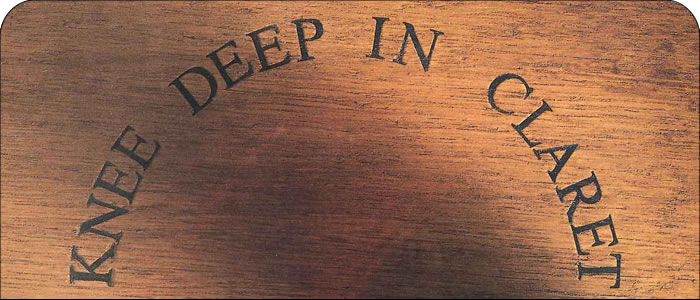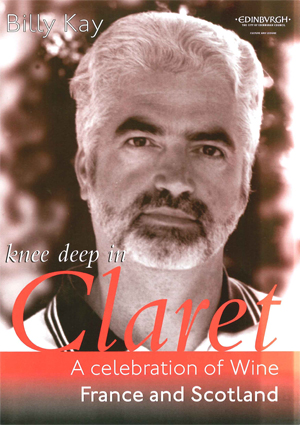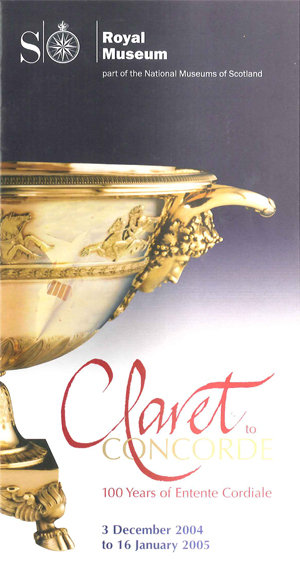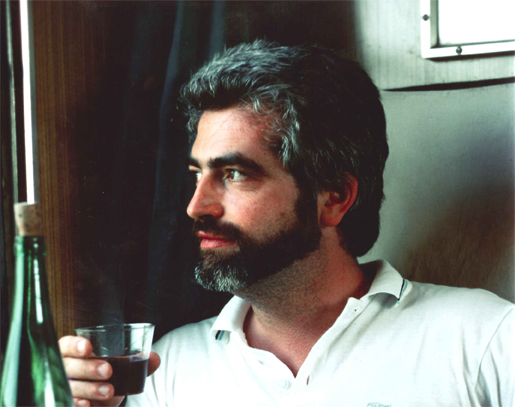
Billy Kay and Wine
Wine has been an interest of Billy Kay´s since he studied French and Scottish literature at Edinburgh University. He is co–author, with Cailean Maclean of the book Knee Deep in Claret – A Celebration of Wine, France and Scotland. He has presented one television programme and several radio features on the same Franco – Scottish theme, In 1994 the Wine Guild of the United Kingdom presented his programme "Fresche Fragrant Clairettis" with the Houghton Award for the best British radio or television programme to promote wine. He has contributed articles on wine history to the Scotsman and Decanter. He has also presented a show based on "Knee Deep in Claret" at the Edinburgh International Festival. His work promoting claret has been recognised in France, and he has been honoured with membership of both the Jurade of St Emilion and the Commanderie du Bontemps of the Medoc and Graves. In 1996 "Knee Deep in Claret" the first programme in a four part series called The Complete Caledonian Imbiber, won the Wines of France Award, the prize a trip to the wine regions of Alsace. BBC Radio Scotland commissioned the series from Kay´s independent company, Odyssey Productions. Since the early 1980´s he has maintained regular contact with his godson William Johnston and the superb wines chosen by William´s father, Jean Marie Johnston. In 2006 the Bordeaux based newspaper Sud Ouest published Kay´s work as a precursor to the Scotland v France rugby international. Billy also acts as a consultant for Gloag Taylor Wines/Wine Routes, a Perthshire based wine firm run by a friend, John King. His latest book The Scottish World contains many references to the historic Scottish predilection for fine wine.
Knee Deep in Claret
A Celebration of Wine, France and Scotland
Billy Kay and Cailean Maclean
Knee Deep in Claret is the definitive book for lovers of wine, France and Scotland and the perfect companion with which to celebrate the 700th anniversary of the Auld Alliance. Richly illustrated, it investigates the fascinating history of the Scots drouth for the great wines of the world and celebrates our imbibing tradition in poetry, prose and song. Above all, it is a book to be enjoyed. Praised by such doyens as Hugh Johnson, John Arlott and Derek Cooper, the following is just a sample of the book´s popular critical acclaim.
The Scotsman
Though made in Bordeaux from grapes not girders, claret has a legitimate claim as Scotland's other national drink. Its role in the fermentation of the Auld Alliance is legend and nowhere better illustrated than in this popular and familiar study… A must for all bacchanalian bibliophiles.
The Field
This wise and witty book will delight all those who love Scotland and/or wine. It is also a telling piece of history, for what the Scots drink has always been a significant guide to their system of politics, and in particular their attitude towards England.
West Highland Free Press
A major and lengthy work… which can justifiably claim to be the authoritative work on the history of the Scottish wine trade, and of Scottish wine drinking… a definitive work.
Scottish Portrait
One of the most pleasingly original and erudite books on wine which I have come across in a long time… throughout… readers can marvel at the detail so lovingly recorded. I raise my glass to the authors.
The Grapevine
This beautifully illustrated book investigates all aspects of the great imbibing history of Claret in Scotland. History is not, perhaps, the best word to use, for it is written in a style that makes the subject a living thing.
The Times Educational Supplement
It is a substantial and beautifully presented anthology of anecdotes about the Scots´ thirst for claret over a period of 600 years… It is written with spirit and brings together a vast array of heterogeneous titbits likely to be of interest both to many wine lovers and those concerned with the fascinating byways of Scottish social history.
The List
As a Christmas present for a Scots wine enthusiast – or for anyone interested in Scottish social history – Knee Deep in Claret is unsurpassable.(Dare I say it, if you have to choose between a bottle and this book as a present for the old man, go for the book – he´d probably rather choose his own bottle anyway!) …well–researched, well presented and well thought out.
The Herald
It is easy to enjoy this book which assembles a great deal of unusual information and it is written with gusto and conviction.
Aberdeen Evening Express
A joyous romp into the alcoholic world of our ancestors.

(A flyer promoting a talk by Billy in Edinburgh)
Yorkshire Post
It is not often that a wine book turns out to be amusing as well as informative. But Knee Deep in claret… relates some lively adventures by medieval Scots who came to Bordeaux to buy claret, nearly as staple a drink in Scotland as malt whisky.
John Arlott, The Guardian
A serious work of vinous and national history.
From The Complete Caledonian Imbiber. Audio
The Johnston family of wine négociants have been in the Bordeaux region since the late 17th century. Here Jean-Marie Johnston and Esmé Johnston talk about their family history followed by a Jacobite exile song about "the land of sweet Bordeaux " sung by Rod Paterson. 02 45
Signed copies of Knee Deep in Claret are available – for details/cost please send an e–mail to
Related Talks
Knee Deep in Claret – a Celebation of Wine, France and Scotland. Billy Kay tells the story of Scotland´s other national drink, the red wine of Bordeaux called claret, which once linked Scotland and France so closely it became known as "the bloodstream of the Auld Alliance" Knee Deep in Claret was originally performed as a critically acclaimed show as part of Edinburgh International Festival in 1985.
For special occasions Billy can be joined by one of Scotland´s finest traditonal singers, his friend Rod Paterson of Jock Tamsons Bairns who sings the Franco–Scottish songs belonging to the tradition – "Guid Claret Best Keeps Oot the Cauld" "Garçon Malheureux" and "Gae Bring Tae Me a Pint o Wine!"
Billy can give entertaining and amusing talks on Scotland's vinous history, illustrated with extracts from radio and television programmes he has made on the claret tradition; conduct talks and tastings – he has run his own wine tasting group for the past fifteen years; organise events where each course of a dinner or lunch is related to a wine with Scottish historical connections e.g. Sancerre, the Loire, Bollinger Champagne, Claret, port, sherry, madeira, mountain/malaga, California, Australia, Tokai etc, etc.
Clients for such events have included BNP Paribas, Clydesdale Bank, The Franco Scottish Society, Abertay Historical Society, Scotland House in Brussels, Dundee-Orléans Twinning Association, the National Museum of Scotland, Gleneagles and Greywalls Hotel, the University of St Andrew's Researcher's Night event, the University of Edinburgh's Alumni event etc. For corporate entertainment, clients have been offered signed copies of 'Knee Deep in Claret' or The Scottish World as part of the event.
Other Newspaper/Magazine Articles relating to wine:
The Scotsman:
1. River of Gold – On Scottish influence in the Port trade.
2. On R.L. Stevenson in the Napa Valley.
3. On Portugal´s Alentejo.
4. On Mouton Rothschild
Article on claret in Institut Francais d´Ecosse publication "L´Alliance Franco–Ecossaise – La Plus Vieille Alliance du Monde Decanter magazine article on the Scots claret trade.

(´Claret to Concorde´ 100 Years of Entente Cordiale – as part of this Billy gave a talk in the National Museum of Scotland)
HERE IS A FLAVOUR OF BILLY´S WRITING ON WINE HISTORY:
Claret: Bloodstream of the Auld Alliance
Guid claret best keeps out the cauld
an drives awa the winter soon
It maks a man baith gash an bauld
an heaves his saul ayont the mune.
Alan Ramsay´s poem was in praise of clairet, the light, limpid rosé wine of Bordeaux, which became claret, the dark, powerful, purple–red liquid which linked Scotland and France so closely it was known as the Bloodstream of the Auld Alliance. But why did the Scots continue drinking fine claret, while their unfortunate neighbours to the South had to make do with a sweet concoction from the wilds of the Douro called Port?
It all goes back over 700 years to the origins of the Auld Alliance, an event precipitated by the death of Alexander 111 in 1286. The King fell over the cliffs at Kinghorn in Fife, en route to his young French wife Yolande and yet another attempt to give Scotland the heir her political stability demanded. It was not to be, and the English manipulated the political vacuum with dire consequences for the Scottish nation. The black rumour is that Alexander´s demise may have been due to over indulgence in claret before setting off. That offered no consolation to one Jean Mazun, négociant á Bordeaux, to whom Alexander owed more than £2000 for wine. Mazun tried to obtain satisfaction from the puppet king supported by the English, John Balliol, but he was to die cursing the Scots and their meanness. The Scots today blame their undeserved reputation for greediness on the image made famous by Harry Lauder. But Jean Mazun had the image of l´écossais avare well established in Bordeaux by the beginning of the 14th century! As to the non–payment of the wine, it was nothing personal, nor was it anti–French. It was simply that Mazun was an English subject, and therefore got what he deserved. Nothing!
Ever since the fifteenth century when the Scots fought alongside their Auld Allies to remove the Auld Enemy from their last toehold in south–west France, there has been the underlying suspicion that we were only there for the claret. For one of the long term rewards bestowed on us by the grateful French was the granting of privileges in the wine trade which gave us status and commercial advantage over other nations. A peeved Englishman of the Elizabethan period reluctantly explained the "special relationship" the Scots enjoyed: "Because he hath always been an useful confederate to France against England, he hath right of pre–emption or first choice of wines in Bordeaux; he is also permitted to carry his ordnance to the very walls of the town." The practical result of this was that while the English had to surrender their arms when entering the Gironde, apply for passports, and be subject to curfews, the Scots sailed blythely up river to get the pick of the new vintage at reduced rates, and head for home in time Hogmanay! The Scots official privileges lasted until Colbert, showing no sentimental attachment to the land of his ancestors, withdrew them in the 1660´s.
While the Reformation ended the direct French cultural influence at Court, the Scots colony in Bordeaux actually increased as the merchants there were joined by teachers and intellectuals spreading the teachings of Calvin and Knox to this strongly Huguenot part of France. The great humanist, George Buchanan, for example, taught the philosopher Montaigne at Bordeaux University before returning eventually to Scotland to tutor James V1. In the late 17th and 18th centuries, another group of Scots settled in France, Jacobite political exiles loyal to the Stuarts and against the Union with England which had come into force against the will of the majority of the population in 1707. At home Jacobites and cultural nationalists drank claret as a symbol of Scots independence, rather than succumb to the "politically correct" English favourite, Port. The national standpoint is expressed in rhyme.
Firm and erect, the Caledonian stood
Old was his mutton and his claret good.
Let them drink Port! The English statesman cried,
He drank the poison and his spirit died.
John Home, politically far from being Jacobite, wrote that epigram, proving that the country was united in seeing claret as a symbol of Scottish identity. So much so, that everyone turned a blind eye to the universal practice of smuggling the stuff throughout the 18th century.
While the 19th and early 20th century saw claret move up the social scale, the wine trade in Scotland flourished with the ancient expertise now used to supply England and the Empire with wine. Leith–bottled claret enjoyed an international reputation, supplied by companies such Cockburn´s of Leith. They guarded their reputations jealously, and were extremely aware of the importance of the Scottish market, and the level of expectancy among its connoisseurs. A letter from John Cockburn to a firm of Bordeaux négociants regarding the quality of the premiers crus of the 1828 vintage is revealing:
There is a poverty about them which we did not anticipate. Your opinion of them being so much higher than ours we hope you will have no objection to our sending you what remains which we cannot doubt your easily disposing of in London.
Of the many Scottishs firms once based in the historic Chartrons wine quay at Bordeaux there remains only the Johnstons, but with a boulevard named after them they have an illustrious history in the region and in the wine trade. They share a pride in their Scottish ancestry, and are known to fly the Cross of St. Andrew alongside the Tricolour at important gatherings. They also maintain strong businness and personal links with Scotland. As parain [godfather] to William Johnston of Chateau Malecau in Pauillac, here is one Scot who will continue to enjoy the wine, the place and the people of that delightful part of the world for the rest of his life.
THE COMPLETE CALEDONIAN IMBIBER (4 X 26" and 4 X 30")
audio
From the programme "Let Them Drink Port"!

